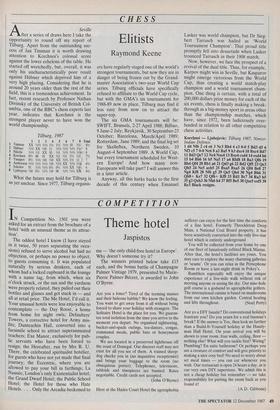CHESS
ASeville fter a series of draws here I take the opportunity to round off my report of Tilburg. Apart from the outstanding suc- cess of Jan Timman it is worth drawing attention to Korchnoi's colossal score against the lower echelons of the table. He started off wretchedly, but, overall, it was only his uncharacteristically poor result against Hiibner which deprived him of a very high placing. Considering that he is around 20 years older than the rest of the field, this is a tremendous achievement. In fact, recent research by Professor Nathan Divinsky of the University of British Col- umbia, one of the BBC's chess experts last year, indicates that Korchnoi is the strongest player never to have won the world championship.
Tilburg, 1987 I 2 3 4 5 6 7 8 Total 1 Timman XX 1/21/2 1/21/2 11/2 11/2 1/21/2 10 1/21,' 81/2 2 Hubner 1/21/2 XX V-20 11 1/21/2 1/21/2 1/21/2 1 1 8
3 Nikotic 1/21/2 1/21 XX 10 1/21 1/21/2 1/21/2 1/2 8 4 Korchnoi 01/2 00 01 XX WI 1/21 11/2 1/2, 71/2
5 Yusupov 01/2 1/21/2 1/20 Y20 XX 1/21/2 11/2 11 ! 7 6 Andersson 1/21/2 1/21/2 1/21/2 1/20 1/21/2 XX 1/21/2 1/2 61/2
7 Sokolov 01 1/21/2 1/21/2 01/2 01/2 1/21/2 XX 6
8 Ljubojevic 1f20 01/2 1/21/2 1/20 00 1/21/2 1/21/2 41/2 What the future may hold for Tilburg is as yet unclear. Since 1977, Tilburg organis-
Elitists
Raymond Keene
ers have regularly staged one of the world's strongest tournaments, but now they are in danger of being frozen out by the Grand- master Association's two-year World Cup series. Tilburg officials have specifically refused to affiliate to the World Cup cycle, but with the GMA's six tournaments for 1988-89 now in place, Tilburg may find it less easy from now on to attract the super-top.
The six GMA tournaments will be: SWIFT, Brussels, 2-27 April 1988; Bilbao, 9 June-2 July; Reykjavik, 30 September-23 October; Barcelona, March/April 1989; Rotterdam, June 1989; and the final leg set for Skelleftea, Northern Sweden, 10 August-4 September 1989. A World Cup, but every tournament scheduled for West- ern Europe! And how many non- Europeans will take part? I will answer this in a later article.
Anyway, all this harks backs to the first decade of this century when Emanuel Lasker was world champion, but Dr Sieg- bert Tarrasch was hailed as 'World Tournament Champion'. That proud title promptly fell into desuetude when Lasker trounced Tarrasch in their 1908 match.
Now, however, we face the prospect of a revival of the dual title. Thus, for example, Karpov might win in Seville, but Kasparov might emerge victorious from the World Cup, thus creating a world match-play champion and a world tournament cham- pion. One thing is certain, with a total of 200,000 dollars prize money for each of the six events, chess is finally making a break- through as a big-money sport in areas other than the championship matches, which have, since 1972, been ludicrously over- funded in relation to all other competitive chess activities.
Korchnoi — Ljubojevic: Tilburg 1987; Nimzo- Indian Defence.
1 d4 Nf6 2 c4 e6 3 Nc3 Bb4 4 e3 0-0 5 Bd3 c15 6 Nf3 c5 7 0-0 Nc6 8 a3 Ba5 9 h3 dxc4 10 Bxc4 Bd7 11 Bd3 Qe7 12 Ne4 Nxe4 13 Bxe4 cxd4 14 exd4 h6 15 b4 Bb6 16 b5 Na5 17 a4 Rfd8 18 Ba3 Qf6 19 Bb4 Qf4 20 Bbl a6 21 Qd3 g6 22 Bd2 Qf5 23 Qe3 Qh5 24 Ne5 axb5 25 BxaS BxaS 26 Qf4 BeS 27 Ng4 Kf8 28 Nf6 g5 29 Qe5 Qh4 30 Ng4 Bb6 31 Qh8+ Ke7 32 Qf6+ Kf8 33 Rdl Bc7 34 Ra3 h5 35 g3 Qxh3 36 Nh6 h4 37 Bf5 Be5 38 Qxe5 exf5 39 Re3 Black resigns.


























































 Previous page
Previous page